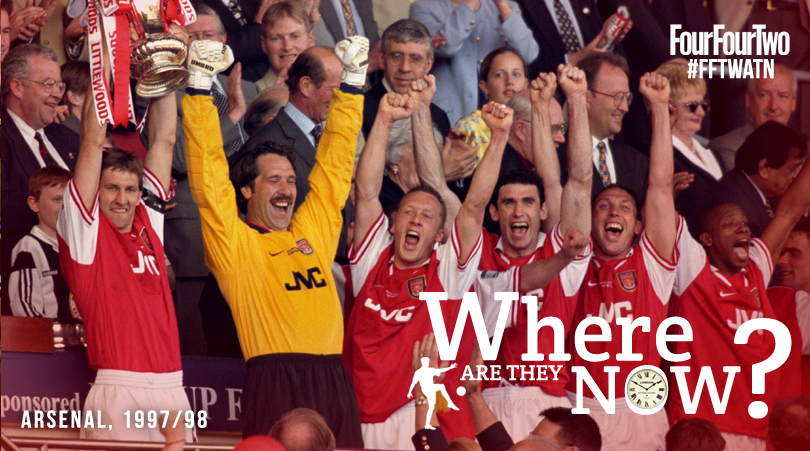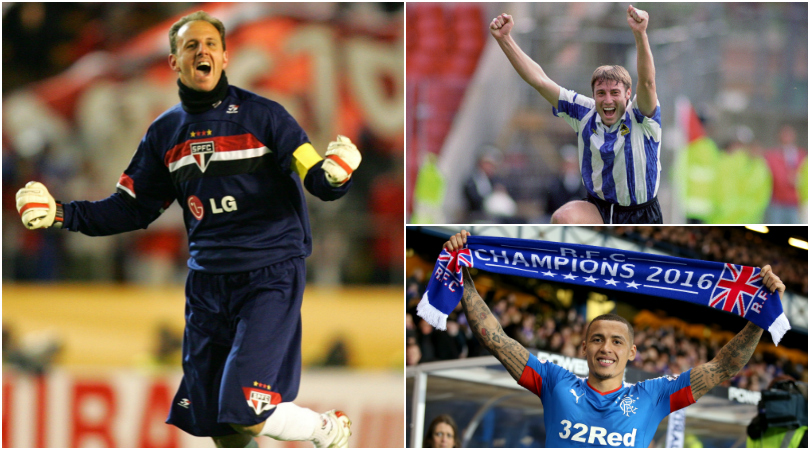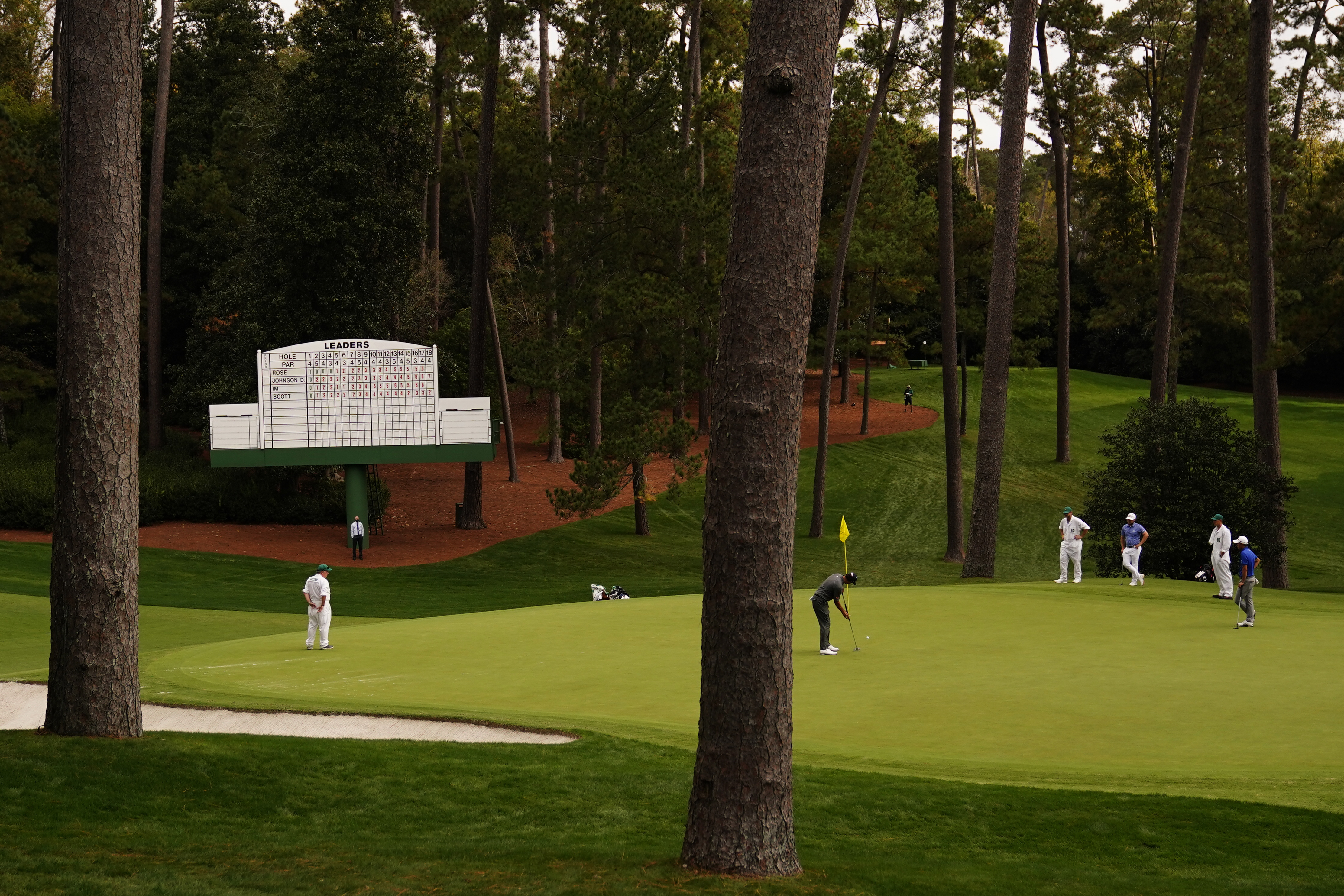Where Are They Now? Arsenal’s 1997/98 Double winners
Can you remember who was part of Arsene Wenger’s first great Gunners side? Dig in to find out more about them

David Seaman
Despite a mid-season injury, ‘Spunky’ (his nickname at school) was always Wenger’s first-choice goalkeeper in the season.
Cashing in on his Euro 96 fame, Seaman was seemingly everywhere in the late ‘90s, appearing in football blooper videos and on several chat shows. He exuded calm on the pitch, cajoling and organising the legendary back four to keep a raft of top-class strikers at bay.
He may have become prone to the odd mistake (particularly with England, from one speculative lob and a direct goal from a corner later in his career), and drawn more attention for his pony-tail than anything else, but he remained No.1 for the 2001/02 Double too.
Seaman departed for Manchester City in 2003 but was forced to call time on his career in January 2004 thanks to injury. Since then he’s appeared on Dancing On Ice – and married his dance partner Frankie Poultney – and played a great deal of golf in Portugal.
Lee Dixon
Initially considered past his sell-by date when Wenger arrived, the tenacious right-back soon revelled in the freedom afforded to him by his new boss.
Get FourFourTwo Newsletter
The best features, fun and footballing quizzes, straight to your inbox every week.
Dixon’s quicksilver raids down the right were the source of many attacks throughout the Double-winning season, although the ex-Stoke man sacrificed none of the tactical acumen drilled into him by George Graham a decade earlier.
Despite being 34 in 1998, he was another of Wenger’s veterans who stuck around long enough to win another Double in 2002. He’s now enjoying himself on ITV alongside Roy Keane analysing why the current Arsenal defence isn’t a patch on the one he played in.
Tony Adams
By the time Arsenal won the Double, the Gunners’ alcoholic, tough-as-nails captain had mutated into a sober, poetry-writing, inspirational leader.
Injury-prone and erratic on the pitch, Adams’s career appeared to be in decline in the opening stages of the campaign following a calamitous display at Highbury against Blackburn. But after a period of recuperation, this one-club man returned to cajole his team and score the most beautiful of goals in a May hammering of Everton which confirmed the Gunners as champions.
Adams lifted the second league and cup Double in 2002, then retired. Sadly, his managerial stints at Portsmouth, Wycombe and Gabala haven’t brought him any tangible success since.
Steve Bould
Adams’s erstwhile central defensive partner was one of the most unsung players at Highbury in the late 1990s. Solid as a rock and a potent threat from corners – with his trademark flicked-on header – Bould appeared 24 times, and supplied the chipped pass for his defensive partner’s goal against Everton.
Bould left for Sunderland in 1999, before taking his coaching badges. The former Stoke man worked his way up the ranks at Arsenal, and is now Wenger’s assistant at the Emirates.
Martin Keown
Ultra-competitive central defender Keown was a late starter in the 1997/98 campaign due to a shoulder injury sustained during the summer’s Tournoi de France, but when summoned by Arsene Wenger his exacting standards brought out the best in himself and others.
Keown continued to grow in stature throughout the early noughties, and left Arsenal after securing a championship medal (and roughing up Ruud van Nistelrooy) during the ‘Invincibles’ year of 2004.
Following a brief and unhappy spell at Leicester, Keown became a pundit for the BBC, where he remains as direct and uncompromising in his views as he was on the pitch with Arsenal.
Nigel Winterburn
Reluctant though he may have been to use his right foot, Arsenal’s tough-nut left-back had lost none of his potency by this season, jockeying opponents out of position in his customarily combative way.
He also despatched an absolute cracker into the roof of Chelsea’s net in the early stages of the campaign as Arsenal won 3-2 at Stamford Bridge.
Winterburn signed for West Ham in 2000, and now pops up as a pundit at regular intervals to discuss the merits of Arsenal’s tactical acumen – or lack of it.
Patrick Vieira
Wenger’s first signing upon arriving at the club, the midfield colossus dovetailed perfectly with French midfield partner Emmanuel Petit, and acted as a conduit between defence and attack.
When the going got tough for Arsenal, Vieira also dropped back into defence and his bruising encounters with Manchester United’s Roy Keane came to define the rivalry between the two sides in that era.
Appointed skipper when Adams left, Vieira captained Arsenal to league invincibility in 2004.
He subsequently played for Juventus, Inter Milan and Manchester City, and now coaches New York City FC. Regrettably, the relationship with his former Arsenal manager is now somewhat strained.
Emmanuel Petit
Wenger splashed out on foreign talent in the summer of 1997 to fine-tune his side, and the former Monaco man, in tandem with Vieira, gave Arsenal’s midfield a swashbuckling aura.
The duo proved irresistible as the season progressed – and Petit was at his majestic best by the new year as Arsenal motored smoothly towards the Double.
He later turned out for both Barcelona and Chelsea after departing Highbury in 2000, and isn’t backwards in coming forwards when he outlines how he believes his former club should improve via the French media.
Ray Parlour
Once a fully paid-up member of the Arsenal drinking club, Parlour found maturity and consistency under Wenger, and the Romford Pele’s workmanlike approach gave the side a real doggedness in the winter when Arsenal struggled for points and inspiration.
A serial wind-up merchant, Parlour regularly mocked Wenger’s French accent (to his face) and was present and correct when the Gunners marched triumphantly through the early noughties.
The central midfielder left in 2004 and later played for Middlesbrough and Hull, before regularly popping up as a pundit on Sky and ITV, spinning boozy tales from Arsenal’s yesteryear.
Marc Overmars
Signed on the eve of the season from Ajax, the jet-heeled European Cup winner gave Arsenal a serious injection of pace down the left flank.
Equally adept at dispatching a killer cross or cutting in and scoring himself, the Dutchman’s post-Christmas form was often sublime and he netted a season-defining winner for Arsenal at Old Trafford in March.
Along with Petit, Overmars upped sticks and departed to Barcelona in 2000, indicating that Arsenal were mutating into a selling club.
Now football director at Ajax, Overmars recently appeared in a legends charity match at the Emirates against Milan.
Dennis Bergkamp
The peerless orchestrator of so much that was good about Arsenal this season, Bergkamp’s superb performances in the first three months of the campaign (never better illustrated than by his seismic hat-trick at Filbert Street against Leicester) set Arsenal on their way in those opening months.
A slight loss of form and late-season injuries ruled him out of the defining end-of-season clashes, but the non-flying Dutchman embodied Arsenal’s new, enlightened approach to the game.
After eventually departing (and retiring) in 2006, Bergkamp approached his coaching career with gusto and is now assistant manager at Ajax.
Ian Wright
Wright’s goal-laden start to the campaign – including a hat-trick in September against Bolton at Highbury which saw him break Cliff Bastin’s long-held goalscoring record – petered out by November, and Nicolas Anelka took his place in the side.
He only returned once the league title had been secured, joined West Ham and later played for Nottingham Forest (loan), Burnley and Celtic.
Always keen to further his media career, Wright hosted a Friday night chat show – Friday Night’s All Wright – before later becoming a prominent pundit on both the BBC and ITV.
Nicolas Anelka
The mercurial Frenchman – signed for just £500,000 – took time to adapt in the first team, but after netting his first goal in a thrilling 3-2 win against Manchester United in November, he saved his best form for the spring.
After that, his quicksilver sprints and sharp finishing were the focal point of Arsenal’s long winning run throughout March and April, and his second goal in the 1998 FA Cup Final against Newcastle confirmed Arsenal as Double winners.
Anelka scored (and sulked) his way through the 1998/99 season, claimed to be “bored in London” and joined Real Madrid for a whopping £23 million. The Frenchman subsequently played for a string of clubs, attracting controversy (including the infamous Quenelle gesture and international ban during the 2010 World Cup) and plaudits in equal measure for the rest of his career.
Alex Manninger
Presented with his big chance in the new year following Seaman’s injury, the Austrian keeper kept six consecutive clean sheets in March and April, including a superb display at Old Trafford which kept United at bay in March.
Meanwhile, in the FA Cup quarter-final replay shootout at West Ham he saved Eyal Berkovic’s spot-kick which sent Arsenal through.
Manninger played understudy to Seaman for a couple more seasons, then kept goal in various countries, clocking up just 186 appearances in 16 years. Now third-choice keeper at Liverpool, Manninger is the only member of the 1997/98 Arsenal team who is still playing (if only technically).
Arsene Wenger
After leading the Gunners to the domestic Double in his second season at the helm, Wenger was lauded for transforming Arsenal from an uncompromising, blue-collar side into a skilful, cosmopolitan and devastatingly quick one.
In the next seven years, the Frenchman led Arsenal to another Double in 2002, and two more FA Cups (in 2003 and 2005).
Still at the helm 18 years after 1998’s success, Wenger’s Arsenal haven’t looked genuine title contenders for over 12 years. His teams have always been easy on the eye, but, despite a move to the Emirates Stadium in 2006 and the two FA Cups they finally won in 2014 and 2015, the Premier League crown remains elusive.
More Where Are They Now? • New features you'd love on FourFourTwo.com
Jon Spurling is a history and politics teacher in his day job, but has written articles and interviewed footballers for numerous publications at home and abroad over the last 25 years. He is a long-time contributor to FourFourTwo and has authored seven books, including the best-selling Highbury: The Story of Arsenal in N5, and Get It On: How The '70s Rocked Football was published in March 2022.


